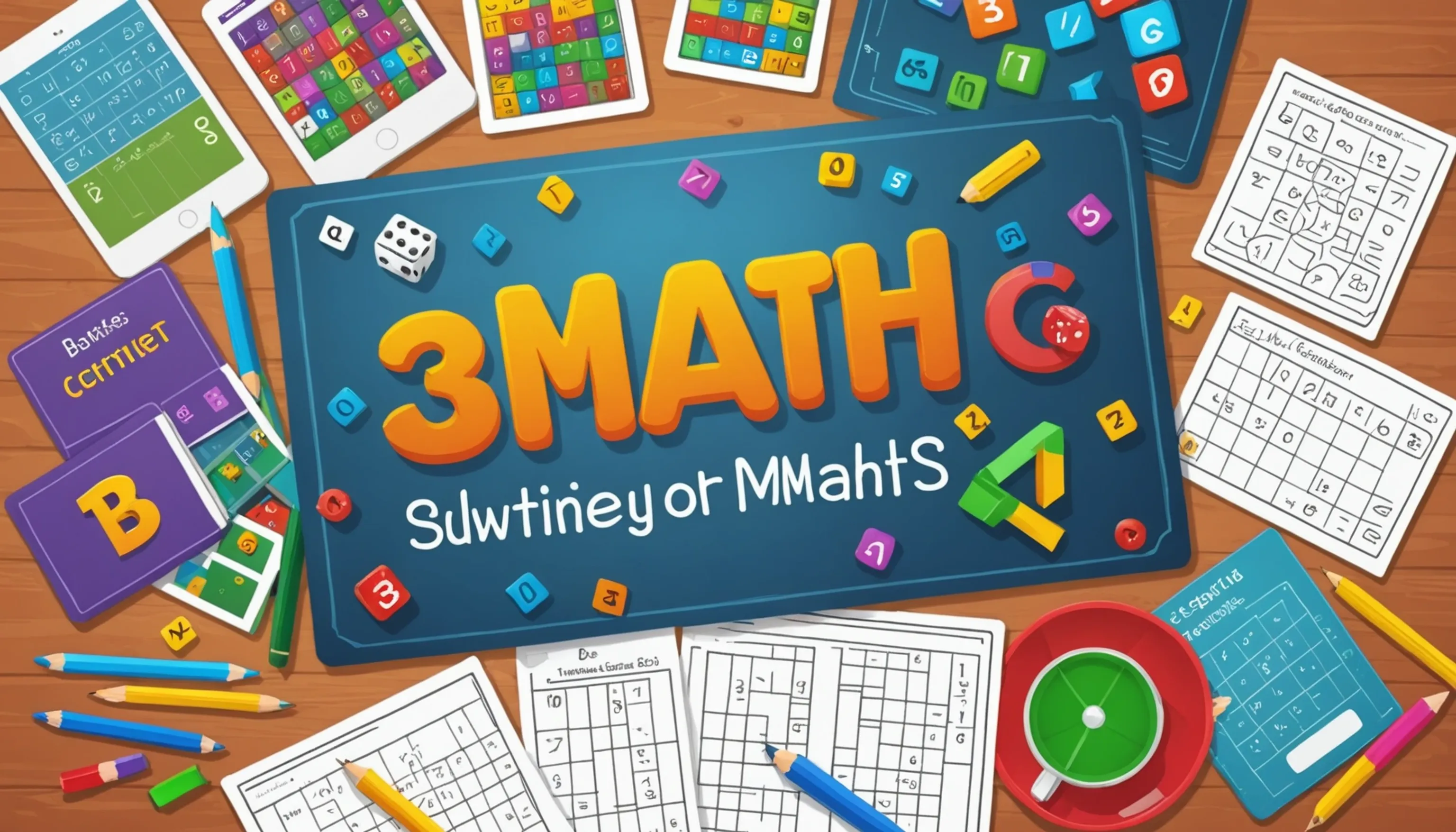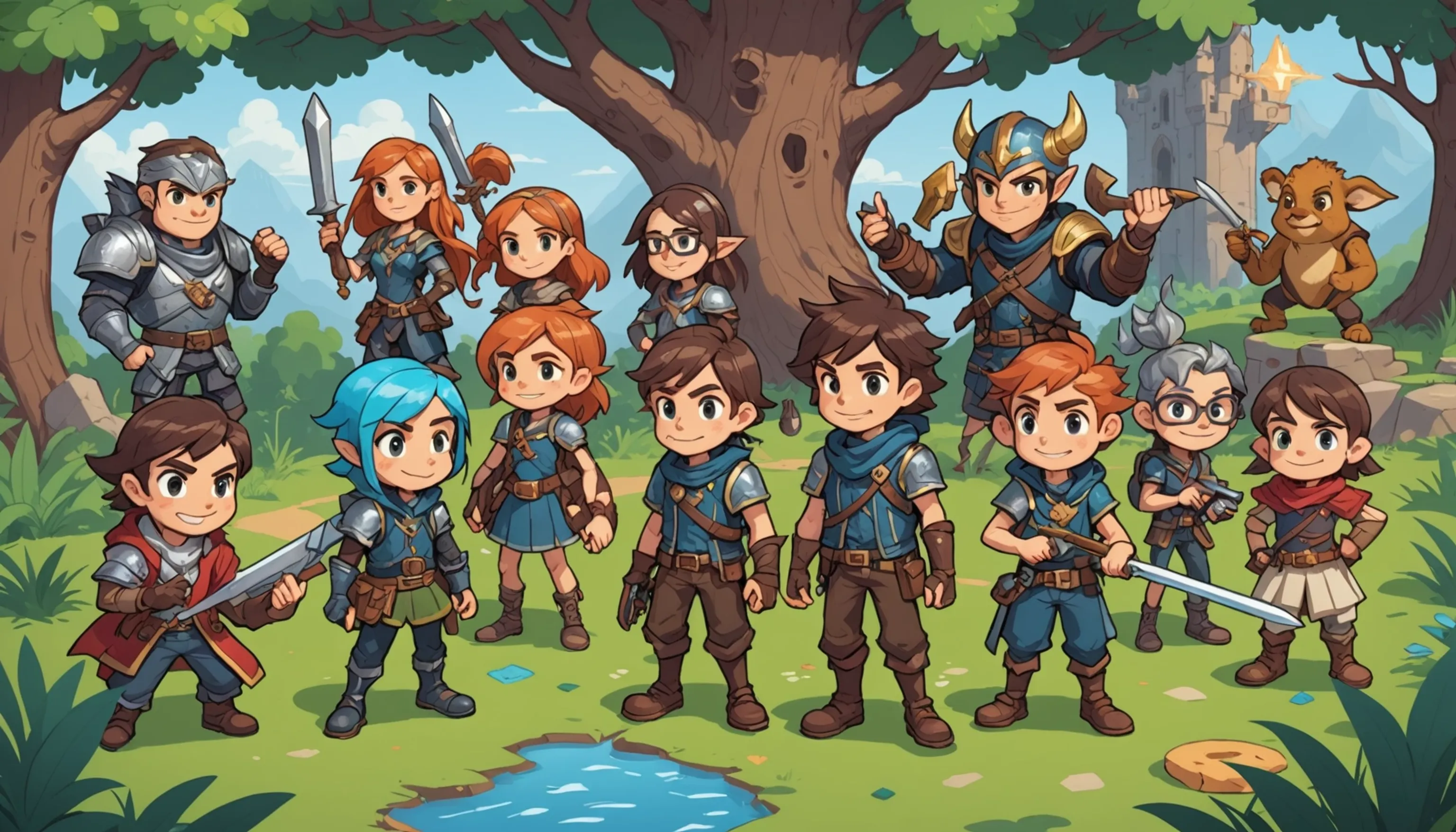Free Math Games for Problem-Solving Skills
 HvWHenry van Wagenberg
HvWHenry van Wagenberg
Free Math Games to Enhance Problem-Solving Skills
In today’s digital age, free math games are a fantastic resource for enhancing problem-solving skills in teenagers. These games transform traditional learning into an engaging experience, allowing students to tackle math challenges in a fun and interactive way.
By incorporating these games into their study routines, teens can improve their critical thinking abilities while enjoying the process. Platforms like Khan Academy and Prodigy Math offer a variety of game formats, ensuring that there's something for every student. Utilizing these resources can make math practice more enjoyable and effective.
Benefits of Math Games for Teens
Math games offer numerous benefits for teenagers, particularly in developing their problem-solving skills. These games make learning math enjoyable, encouraging teens to engage more actively with mathematical concepts. Here are some key advantages:
- Enhanced Engagement: Traditional math instruction can sometimes feel monotonous. Math games provide a dynamic and interactive way for students to learn, keeping their interest alive.
- Improved Critical Thinking: Many math games require players to think critically and strategize. This not only helps in understanding math concepts but also enhances their overall cognitive abilities.
- Immediate Feedback: Online math games often provide instant feedback, allowing teens to learn from their mistakes right away. This immediate reinforcement helps solidify their understanding of various math topics.
- Collaboration and Competition: Many math games can be played in groups, fostering teamwork and healthy competition among peers. This social aspect can motivate teens to improve their skills while having fun.
- Adaptability: Math games can be tailored to suit different skill levels. Whether a student is struggling with basic concepts or tackling advanced problems, there are games available that cater to their needs.
Incorporating math games into regular study routines not only helps teens build their math skills but also prepares them for real-world problem-solving situations. By making learning enjoyable, these games can significantly boost their confidence in mathematics.

Top Free Math Games for Problem-Solving
When it comes to enhancing problem-solving skills in math, several top free games can make a significant impact. Here are some of the best:
- Khan Academy: Offers a wide range of interactive math challenges that adapt to each student’s learning level, providing personalized feedback.
- Prodigy Math: This engaging game combines adventure and math, allowing students to solve problems to progress through quests and challenges.
- Math Playground: Features a variety of fun math games, logic puzzles, and word problems that stimulate critical thinking.
- Coolmath Games: Provides a collection of brain-teasing games that are both entertaining and educational.
These platforms not only help teens practice math but also build essential skills in a fun, engaging manner. By incorporating these games into learning, students can enhance their problem-solving abilities while enjoying the process.
Khan Academy: Interactive Math Challenges
Khan Academy is a widely recognized platform offering a plethora of interactive math challenges designed to enhance problem-solving skills among teenagers. The platform is completely free and provides a structured approach to learning mathematics, making it accessible to all students.
One of the standout features of Khan Academy is its personalized learning dashboard. This allows students to progress at their own pace, tackling challenges that are suited to their skill level. As they complete exercises, they earn points and badges, which adds an element of gamification to the learning experience. This not only motivates teens but also encourages them to take ownership of their learning.
Khan Academy’s math challenges cover a wide range of topics, from basic arithmetic to advanced calculus. Students can engage with interactive exercises that require critical thinking and problem-solving, reinforcing their understanding of key concepts.
Additionally, the platform offers instructional videos that explain complex topics in an easy-to-understand manner, providing a comprehensive learning experience. By integrating these interactive challenges into their study routine, teens can develop their math skills effectively while enjoying the process. Overall, Khan Academy serves as a valuable resource for parents and educators looking to improve their students' mathematical abilities.

Prodigy Math: Engaging Game for Problem Solving
Prodigy Math is an engaging online game designed to enhance problem-solving skills among teenagers while making learning fun. Set in a fantasy world, Prodigy Math combines the excitement of adventure gaming with rigorous math practice, motivating students to improve their skills through interactive gameplay.
In Prodigy, players create their own characters and embark on quests that require them to solve math problems to progress. The game covers various topics, including arithmetic, algebra, and geometry, ensuring that it aligns with the math curriculum taught in schools. As students advance, they encounter challenges that adapt to their individual learning pace, providing personalized experiences that cater to different skill levels.
One of the key features of Prodigy Math is its assessment and tracking system. Parents and teachers can monitor students’ progress and see how they perform in different areas of math. This allows for targeted support, ensuring that learners can focus on specific skills that need improvement.
Additionally, Prodigy Math fosters a sense of community, as students can connect with peers and compete in friendly challenges. This social aspect not only enhances motivation but also encourages collaboration and communication skills among players. Overall, Prodigy Math is a dynamic tool that effectively combines learning and play, making it a valuable resource for developing problem-solving abilities in teens.
Math Playground: Fun Math Games for Teens
Math Playground is an interactive website offering a variety of fun math games designed specifically for teenagers. This platform effectively combines entertainment with education, making it an ideal resource for enhancing problem-solving skills while engaging students in a playful learning environment.
The site features a wide range of games that cover essential math concepts such as fractions, geometry, and algebra. Each game is designed to challenge students' critical thinking and reasoning abilities, pushing them to solve problems in creative ways. For instance, puzzle games require players to apply mathematical strategies to advance through levels, reinforcing their understanding of key concepts.
Math Playground also includes logic games, word problems, and math challenges that cater to different learning styles. This diversity ensures that every teen can find something that captures their interest, whether they prefer competitive gameplay or collaborative problem-solving.
Moreover, Math Playground offers instructional videos that provide step-by-step explanations of complex topics, making it easier for students to grasp difficult concepts. This resource is particularly beneficial for those who may struggle in a traditional classroom setting.
By incorporating Math Playground into study routines, teenagers can develop their math skills in an enjoyable and effective manner. The platform not only enhances their problem-solving abilities but also fosters a positive attitude towards mathematics, encouraging lifelong learning.
How to Incorporate Math Games into Learning
Incorporating math games into learning can significantly enhance students' problem-solving skills. Here are a few effective strategies:
- Set Regular Game Sessions: Designate specific times each week for math game play, making it a fun routine.
- Use Online Resources: Explore platforms like Khan Academy or Prodigy Math to find engaging games that align with your curriculum.
- Combine with Traditional Learning: Use games to reinforce concepts learned in class, ensuring a balanced approach.
- Encourage Group Play: Foster collaboration by having students play in pairs or small groups, promoting teamwork.
By integrating these strategies, math games can become a powerful tool in developing essential skills.
Setting Up a Game Night for Math Practice
Setting up a game night for math practice is a fantastic way to make learning enjoyable and engaging for teenagers. Here’s how to organize an effective and fun math game night:
1. Choose a Theme: Start by selecting a theme that resonates with your teens. This could be a specific math topic, such as geometry or algebra, or a general math challenge night.
2. Select Games: Curate a list of math games that are both educational and entertaining. Consider using online platforms like Prodigy Math, Math Playground, or Kahoot for interactive quizzes. You can also include board games that emphasize math skills, such as Monopoly or Math Dice.
3. Create Teams: Divide participants into teams to foster collaboration and friendly competition. This not only makes the games more exciting but also encourages teamwork and communication.
4. Set Up a Comfortable Space: Arrange a comfortable area with enough seating and resources, such as calculators, paper, and snacks. A relaxed environment can enhance focus and enjoyment.
5. Plan Prizes: To motivate participants, consider offering small prizes for winning teams. This could be as simple as certificates or fun math-themed goodies.
6. Encourage Discussion: After each game, take a moment to discuss the strategies used and the math concepts learned. This reinforces the educational value of the experience.
By following these steps, game night can become a regular and rewarding part of math practice, promoting both learning and enjoyment.
Using Online Resources for Math Games
Utilizing online resources for math games is an effective way to enhance students' problem-solving skills while making learning enjoyable. With numerous platforms available, parents and teachers can easily integrate these resources into their teaching strategies. Here’s how to make the most of online math games:
1. Explore Reputable Websites: Websites like Khan Academy, Prodigy Math, and Math Playground offer a wide variety of interactive games that cater to different skill levels. These platforms often align with school curricula, ensuring that the games are both educational and relevant.
2. Set Learning Goals: Before diving into games, establish specific learning objectives. This could include mastering particular math concepts or improving speed and accuracy. Having clear goals helps focus the gaming experience.
3. Incorporate Variety: To keep students engaged, encourage the use of various games that cover different topics. Mixing puzzles, quizzes, and strategy games can cater to diverse learning styles and preferences.
4. Monitor Progress: Many online resources provide tracking features that allow parents and teachers to monitor students' progress. Use these tools to identify areas that need improvement and adjust game selections accordingly.
5. Encourage Group Play: Online math games can also foster collaboration. Encourage students to play together, promoting teamwork and discussion about strategies and solutions.
By effectively using online resources, math games can become a vital part of a student’s learning journey, making math practice engaging and productive.
